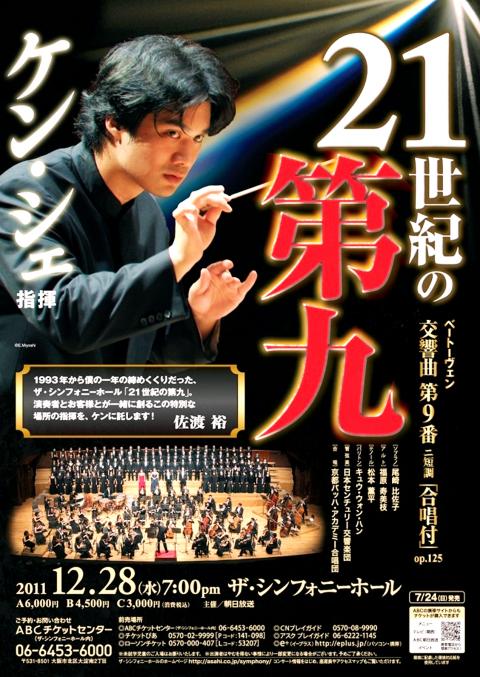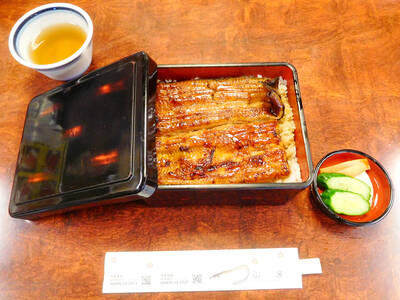Japan’s 2012 New Year’s Eve concert featuring Ludwig van Beethoven’s Symphony No. 9 in D minor, Op. 125 will be conducted by Kenneth Hsieh, a Canadian conductor of Taiwanese descent, for the first time in Tokyo on Friday. Two years ago, Japanese conductor Yutaka Sado, who has conducted the year-end concert for 18 consecutive years, made Hsieh his successor of choice. This year Hsieh is finally picking up the baton to conduct the year’s most important concert in Japan. The news is exciting for his fans both in Taiwan and Canada, and some of them have even booked tickets to fly to Japan to attend his concerts.
In addition to the concert with the Japan Philharmonic Orchestra at the Tokyo Bunka Kaikan on Friday, Hsieh will also conduct the Japan Century Orchestra in a second concert, which will be broadcast live on television, at the Osaka Symphony Hall in Osaka next Wednesday.
According to Hsieh, Beethoven’s Symphony No. 9 lasts about 70 minutes without intermission, making it more challenging than other symphonies. Hsieh said he has been concentrating mostly on how to coordinate the solo vocalists’ parts and the symphony parts in the final movement and how to bring the whole piece to its climax as the entire chorus joins in.

Photo: Chang Ling-chu, Taipei Times
照片:自由時報記者張伶銖
In an interview, Hsieh mentioned the global impact of the European sovereign debt crisis, in particular on Europe’s classical music market. He said the European debt crisis has affected his previously scheduled concert plans in Italy. He also expressed concerns about how the crisis might influence the mood of classical music enthusiasts as they attend concerts.
Next year Hsieh’s performances will primarily be based in Japan and Vancouver, Canada. Apart from having confirmed that he is conducting both the 2012 and 2013 New Year’s Eve concerts in Japan, he will also give at least three performances with the Vancouver Metropolitan Orchestra, which he established, as the orchestra enters its 10th year.
(LIBERTY TIMES, TRANSLATED BY LIN YA-TI)
即將於本週五在東京登場的「日本新年音樂會--路德維希‧范‧貝多芬的《第九號D小調作品第一百二十五號交響曲》音樂會」,首度由台裔指揮家謝建得擔任指揮。連續十八年擔任指揮的日本指揮家佐渡裕,早在兩年前即已屬意由謝建得「接棒」,今年終於如願擔任日本年度最重要的一場音樂會指揮。此消息令在台灣及在加拿大的樂迷興奮不已,有的並已訂好機票,準備追隨他去日本欣賞音樂會。
除本週五在東京文化會館與日本愛樂交響樂團的演出外,謝建得還將於下週三在大阪交響樂音樂廳與日本世紀交響樂團合作演出另一場,在大阪的音樂會,將有電視轉播。
謝建得說,指揮貝多芬《第九號交響曲》,將是七十分鐘不間斷的演出,比起其他樂曲更具挑戰性。最後一個樂章中,如何令獨唱者與交響樂間產生協調,以及在大合唱加入時,將全曲帶入高潮,則是他花最多心思準備的部分。
受訪時,謝建得提及這次歐洲主權債券危機對全球、尤其是對歐洲古典音樂市場的影響。他說,歐債危機其實已影響他在義大利原來已經談妥的演出計劃,他擔心這次危機會影響樂迷進音樂廳欣賞古典音樂的心情。
至於明年,謝建得主要演出計劃仍將在日本及加拿大溫哥華,除了已確定二○一二年與二○一三年的日本新年音樂會,繼續由他指揮外,他在溫哥華創立的大都會管絃樂團明年進入第十年,將至少有三場音樂會。
(自由時報記者張伶銖)

Microsoft on Feb. 28 announced it was retiring Skype, the online voice and video call pioneer that the tech titan acquired in 2011. “Starting in May 2025, Skype will no longer be available,” said a post from Skype support on X, directing users to sign into Microsoft’s Teams platform for further use of its services. Skype was founded in 2003 by Scandinavians Niklas Zennstrom and Janus Friis in Estonia, revolutionizing Internet communication by offering free voice calls between computers and affordable rates for calls to landlines and mobile phones. Over the years, and as Internet speeds improved, Skype evolved to

A: It’s a pity that I can’t go to Australian pop diva Kylie Minogue’s concert. B: Why not? A: Hit Japanese singer Kenshi Yonezu is staging two shows at the Taipei Arena this weekend, and I already bought tickets long ago. B: Wow, isn’t he one of the most popular Japanese singers in recent years? A: And Yonezu’s megahit “Lemon” topped the Billboard Japan Hot 100’s year-end chart in 2018 and 2019 consecutively. A: 我不能去澳洲歌后凱莉米諾的演唱會真可惜。 B: 為什麼? A: 日本人氣歌手米津玄師週末將在小巨蛋熱唱兩場,我早早就買票啦。 B: 哇他可是日本近年來最紅的歌手之一。 A: 米津的神曲《Lemon》甚至還在2018、2019年連續稱霸告示牌日本單曲榜年度冠軍! (By Eddy Chang, Taipei Times/台北時報張迪)

A: Australian pop diva Kylie Minogue is set to visit Taiwan for the third time on Saturday. B: I remember that her Taipei concerts in 2008 and 2011 caused a sensation, and I love her megahit “Can’t Get You Out of My Head.” A: This will be her first time performing in the southern city of Kaohsiung. B: Many music critics praise Kylie’s show as “a must-see in your lifetime.” A: Let’s go to Kaohsiung this weekend. A: 澳洲歌后凱莉米諾週六即將三度訪台。 B: 她曾在2008、2011年兩度在台北開唱都造成大轟動,我超愛她的神曲《Can’t Get You Out of My Head》。 A: 這次可是她首度唱進南台灣的高雄呢。 B: 許多樂評家說她的演唱會是「此生必看」! A: 那我們週末去高雄吧。 (By Eddy Chang, Taipei Times/台北時報張迪)

Donburi, often simply called don, is a beloved Japanese dish that consists of a bowl of steamed rice topped with various other ingredients. The word donburi itself actually means “bowl” in Japanese, but it has come to represent much more than just a vessel. Donburi first emerged during the Edo period (1603–1867) as a quick and convenient meal for busy city dwellers. By the 19th century, donburi had become immensely popular among theater enthusiasts, who often purchased these portable meals to enjoy during long performances. Una-don, a donburi topped with grilled eel, was a particular favorite. Easy-to-carry and satisfying,